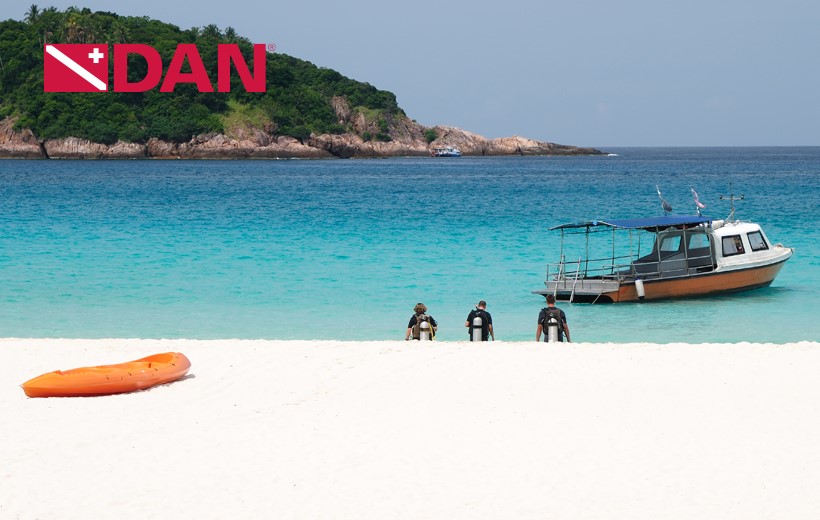Medical & Fitness
Section
Diving in the Era of COVID-19
April 2020 — I come to you as a recreational and technical diving instructor, as a physician consultant for Divers Alert Network, and as a COVID-19 survivor. For me, it was just an occupational hazard. I tested positive for COVID-19 after seeing a patient in my cardiology clinic for an unrelated condition who seemed quite short of breath. He was admitted to the ICU and tested positive for COVID-19.
Diving docs warn using scuba when freediving can be fatal
The Australian authors—Dr Neil Banham (lead) and Dr John Lippmann—reported that a 26-year-old healthy male freediver dived to 10m (32.8ft) where he met a friend who was diving on scuba. The freediver breathed from a scuba regulator before ascending.
It may have been that he held much of his breath during ascent, which would have been his usual and generally safe practice with normal breath hold diving. — Banham, Lippmann
Older scuba divers at risk of heart attack
Cardiac issues have become a leading factor in diving fatalities, according to a study. Hence, older scuba divers have been advised to have regular fitness assessments with their doctors and cut down on factors that can increase one's risk of suffering a heart attack when diving.
Although it is mandatory to be screened for fitness and have one's dive skills certified prior to being issued a C-Card, such certification lasts a lifetime.
Larger spleen enables Bajau to remain underwater longer
The Bajau are an indigenous people in parts of Indonesia renowned for their breath-holding ability when diving for food. They have been known to dive up to 70 metres using nothing more than a set of weights and a pair of wooden goggles.
Previously, scientists have speculated on whether dive capacity is related to spleen size, though no formal studies have been done on humans on a genetic level.
Lack of deco chamber in Pensacola concern dive ops and tourism
Although Visit Pensacola promotes the Oriskany dive site and Florida Panhandle Shipwreck Trail, it has not been made aware of the safety concerns rover the region's lack of hyperbaric chambers to treat decompression sickness Nicole Stacey, spokeswoman for Visit Pensacola, told Pensacola News Journal on Thursday.
She said Visit Pensacola was not involved in any effort to try to improve emergency treatment options for divers and would rely on the diving industry and those professionals in the area to remedy the situation.
Researchers use squid ink to diagnose gum disease
To diagnose gum disease, dentists insert a thin metal probe between the tooth and gum to measure the amount of gum that has shrunk back from the tooth. The depth to which the tool can be inserted indicates the severity of the gum disease.
Apart from being invasive and uncomfortable, this method of diagnosis is sometimes painful for the patient. In addition, the measurements are viable, as the probe can measure only one portion of the tooth at a time.
Enter Jesse Jokerst.
DDRC launches diving ear survey
Ear health problems are one of the most commonly reported issues by divers. Problems can range from a relatively simple condition, for example, “swimmers ear,” to a more serious condition such as barotrauma, which can result in lasting damage to the ear.
Currently, anonymous field data is sparse, therefore Devon-based DDRC is hoping to find out what type of ear problems are most frequently encountered whilst diving if any medical advice was obtained; and if not, what was the outcome.
Management of decompression stress
World-renowned diving medicine expert Dr Neal Pollock gave everyone a lot to think about with his talk on the thoughtful management of decompression stress.
Neal looked at the many factors that can alter decompression stress and the practical strategies all divers can use to optimise decompression safety.
“It is increasingly common for divers to rely on dive computers for their decompression safety. Dive computers do not yet measure or integrate a multitude of factors that can alter decompression stress.”- Dr Neal Pollock.
Diving could be bad for your teeth
The lead of the pilot study, Vinisha Ranna, who is also a keen scuba diver, became interested in the problem after she experienced it herself. In her case it manifested as a squeezing sensation in the teeth, known as barodontalgia
In order to see just how common and severe this problem is, she distributed a questionnaire through social media platforms dedicated to scuba diving and collected data from 100 scuba diving enthusiasts. A substantial number replied they experienced symptoms that range from tooth, jaw and gum pain to loosened crowns and broken dental fillings.












